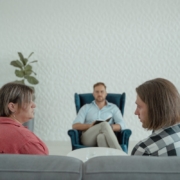What Causes Lack of Communication in a Relationship?
Couples sometimes struggle with communication, but what do you do when it becomes a pattern? It can feel frustrating, or even demoralizing to struggle with relationship communication, especially when you can’t figure out what’s causing it. While every relationship has its own challenges, there are a few common signs of bad communication in a relationship. The good news is that all of them have solutions.
At Well Marriage Center, we love helping relationships thrive. Let’s take a look at some ways people—and couples—struggle with communicating. We’ll also examine some of the ways a therapist could help you improve communication with your partner.
Why Do People Struggle With Communication Skills?
The short answer is: it’s complicated. Truthfully, there are a lot of factors that impact communication skills, and each of those factors affects people in different ways. Most of them, though, can be boiled down to a few basic concepts. Every person:
- Learns to communicate (or not communicate) differently
- Has different needs, and relationships with those needs
- Receives each type of communication differently
- Possesses varying degrees of natural social skill
Since each person is unique (as are their life experiences) it’s easy to see how quickly communication between two people can become challenging. This is especially true in a romantic partnership. When two people become a couple, they each bring their personal formula of communication to the table, and chances are those formulas are very different. What’s more, their gaps in communication may not be apparent at first; the reasons for lack of communication in a relationship are not always the stereotypical fighting or silent treatments. Poor communication can also be dynamics that long go unnoticed, or an inability to express needs. And if either partner has not done the therapeutic work of understanding their patterns or behaviors, this can make bridging communication gaps even more challenging.
So, when it comes to couples communication, there are a lot of moving parts. But what are the most common causes of communication difficulties in a relationship? Let’s take a look.
What Causes Poor Communication in a Relationship?
When there is no communication in a relationship, or the communication feels like a challenge, it’s usually because of one (or both) of the partners is struggling with at least one of the following skill sets:
- Understanding Communication Styles
- Solving Relationship Conflicts
- Expressing Unmet Needs
- Processing External Stress
Let’s take a look at each of these, and how a therapist can help with each skill set.
Understanding Communication Styles
There are four basic styles of communicating: passive, aggressive, passive-aggressive, and assertive. It’s important to not just understand which of these is your default, communication habit, but how your partner communicates as well. This is because each pairing of communication styles sets a tone for different relationship dynamics. If you don’t understand your partner’s communication style (or your own), you’re set up to run into the same kind of trouble over and over again.
How do couples find common ground in communication styles? Ideally, each partner should shoot for assertive communication. When you are assertive, you’re able to boldly express yourself, while giving your partner space to do the same. It also involves respecting your partner’s feelings and concerns. Therapists help couples understand not just what it means to be more assertive, but also how to practice assertive communication in a relationship. This can include tools like “I” statements, which focus on expressing frustration through a lens of feeling, as opposed to a lens of criticism (i.e. “I feel uncomfortable when we don’t talk” versus “You never want to talk about anything”).
Solving Relationship Conflicts
Every relationship has conflict. More than that, every healthy relationship should have conflict on occasion. Conflict, when handled well, can encourage growth, empathy, and an enriched perspective. But the sad reality is that everyone learns different meanings for conflict, a lot of which occurs early in life. For example, people with abandonment issues may fear conflict because to them, it is a sign of impending doom. Conversely, those who grew up in an abusive household may subconsciously associate unhealthy conflict with expressing love, and thus seek out conflict to feel loved.
Therapists show partners how their individual perceptions of conflict play out in the relationship. They may even work in one-on-one sessions with each person to better process conflict, so that when the couple rejoins, there is a better chance of positive resolution. Knowing your partner’s feelings around conflict—and what will trigger an emotional response in them—is key to improving communication.
Expressing Unmet Needs
There may come times in relationships where one partner is not getting what they want or need from the other. Unfortunately, not everyone can clearly express when this happens, and not everyone who can express it does so in a healthy way. On top of that, since everyone receives communication differently, the other partner may either be triggered by the need or may simply not be getting the message—even if it’s clear.
With that, though, it’s important to understand that what seems like “clear communication” to you may not be so clear to your partner. People cannot read minds, and may misunderstand subtle signals, which is why assertive communication is a valuable skill in relationships. Additionally, if you never tell your partner what your needs are, they cannot be there for you. This is another place where therapy helps not just the relationship, but the individual; asking for what you want is an important life skill in general, but it also makes relationships far more fulfilling. People struggle with sharing their needs for a variety of reasons—whether it’s low self-esteem, traumatic events, or expecting their partner to “just know them”—and a good therapist knows how to work with each of these.
Processing External Stress
Life can throw any number of challenges at us—some big, and some small. But no matter what they are, the stressors in our lives impact all of our relationships, including romantic ones. When things become hard for one or both partners, they must come together and support each other through whatever difficulties arise. Unfortunately, it’s not always that easy, as stress can cloud our judgment and make us more reactive, which adds tension to our relationships.
When you’re struggling with life, it’s a good idea to have a therapist—whether you’re in a relationship or not. But it’s especially important for relationships because in addition to your own well-being, you have to look out for the well-being of your partner and the shared bond you two have built together.
Practice Effective Communication With Well Marriage
Whether your relationship is struggling or thriving, it can benefit from improved communication skills. At Well Marriage, our therapists are trained in a variety of tactics, tools, and techniques to enrich any couple’s partnership and help them grow closer. If you’re interested in how therapy can make your love stronger than it’s ever been, please reach out to us and schedule an appointment today.












